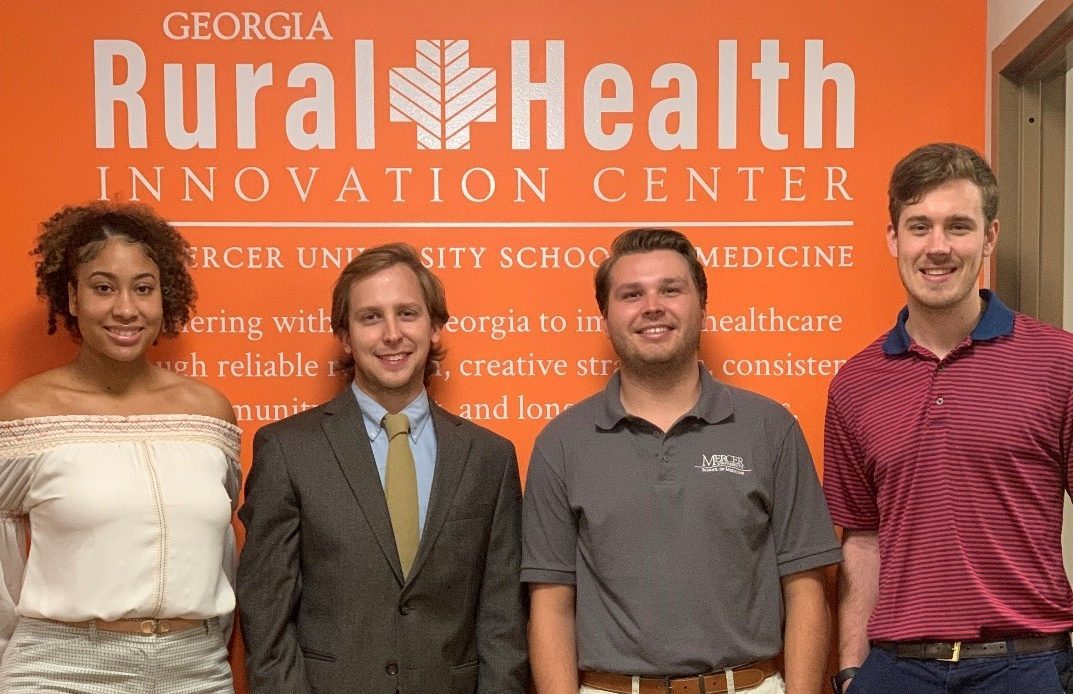
The Georgia Rural Health Innovation Center (GRHIC) in June began offering a new Summer Experience in Maternal Health Observership, open to M.D. students at all of Georgia’s publicly-funded medical schools, including Mercer University School of Medicine (MUSM).
Observership programs offer medical students an opportunity to observe the delivery of care firsthand. The GRHIC’s summer maternal health program offers an expanded learning experience for rising second-year medical students interested in practicing obstetrics and gynecology in rural, medically underserved communities.
For six weeks, students shadow providers in rural Georgia and participate in a specialized curriculum, which includes participation in a weekly journal club to discuss current women’s health literature and an assignment to author a white paper on a chosen major topic in women’s health. The observership culminates in the Maternal Child Health (MCH) Summer Lecture Series, in which students attend lectures highlighting state-of-the-art developments in MCH research and interventions. Specifically, this year’s series featured Postpartum Support International, Georgia Chapter (PSI-GA); Dr. Lindsay Standeven, a reproductive psychiatrist at Johns Hopkins University; and Dr. Rebecca Philipsborn, a pediatrician at Emory University.
“This observership allowed us to do a deep dive on subjects that aren’t typically covered extensively in most medical schools’ curricula,” said Dr. Jennifer Barkin, associate professor of community medicine and obstetrics and gynecology and vice chair of the Department of Community Medicine at MUSM. “The students learned about the use of antidepressants during pregnancy and postpartum, as well as how climate change is impacting health and health care. We can’t wait to develop this program further, as it enhances the learning experience in an important way.”
The idea for the observership was developed by MUSM student Alicia Williams when she found that opportunities for students in their preclinical years were negatively impacted by the pandemic. Many clinical programs were not accepting visiting students or were holding spots for students who were unable to participate last year due to the pandemic
“The time before we begin our clinical years is particularly important, and I wanted to gain experience in my area of interest, but there were no opportunities available,” Williams said. “I knew that Mercer would be open to hearing ideas for a program that would allow both MUSM and visiting students to gain clinical and research experience while spreading the mission to prepare physicians to meet the health care needs of rural and underserved areas of Georgia.”
The observership is open to students from all of Georgia’s publicly-funded medical schools. The inaugural cohort includes MUSM students Alicia Williams, Will Lundy, Ethan Harrison and Nick Maron, pictured above.
Student Participant Feedback
“The chance to work alongside individuals who are impacting rural health for the better every day has served as motivation for me to contribute my part in ensuring the future of health care is equitable and just, regardless of patients’ county of residence.” – Will Lundy (MUSM, Savannah campus)
“In addition to clinical experience, I feel more confident to continue literary reviews and research as the field of women’s health grows.” – Alicia Williams (MUSM, Macon campus)
“I am thankful for all the knowledge I have gained from this experience.” – Ethan Harrison (MUSM, Macon campus)
“The most valuable skill learned was how to interact with physicians and how to make the most of your time with them. I learned more details about topics that we would never dive into that deep in medical school, but are still very important. I feel more prepared than I otherwise would have been for upcoming classes, upcoming rotations and my future as a physician.” – Nick Maron (MUSM, Macon)
Article Submitted by Katherine Lybarger, Marketing and Communications Specialist at Mercer University School of Medicine
